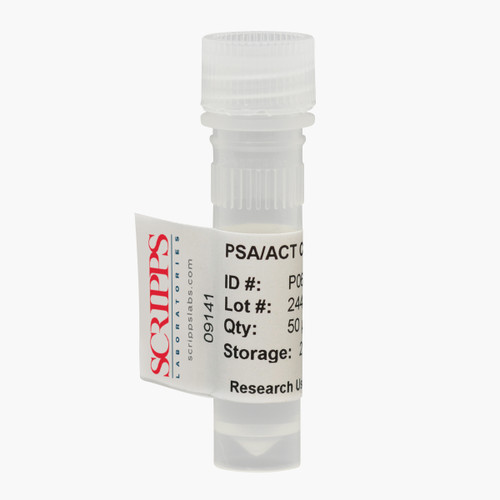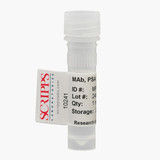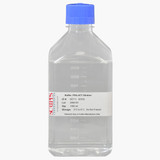Prostate Specific Antigen-α1-Antichymotrypsin Complex (PSA-ACT); ≥95% pure
- SKU:
- 90010-0050
- Catalog Number:
- P0624
- Part Number:
- 90010
- Physical Form:
- Clear liquid
- Purity:
- ≥95% by SDS-PAGE
- PSA : Total Protein Ratio:
- 0.3-0.7
- Comments:
- This product ships on dry ice.
This preparation of Prostate Specific Antigen - a1 Antichymotrypsin Complex (PSA-ACT Complex) is purified from human seminal fluid (PSA) and human plasma (ACT). The material is provided as a liquid in 10 Sodium Acetate, 150 mM Sodium Chloride, 0.1% Sodium Azide, pH 5.6. Purity is ≥95% by SDS-PAGE.
As a primary manufacturer, Scripps is able to offer research- and manufacturing-scale quantities of high quality antigens and antibodies. Materials are produced, packaged, and shipped from our facility in San Diego, California.
Prostate Specific Antigen (PSA), a glycoprotein of the glandular kallikrein family, is a serine protease with chymotrypsin-like enzymatic activity. It has a molecular weight of approximately 33,000-34,000 Da and is found primarily in prostate tissue and seminal fluid. Serum levels of PSA are very low in healthy individuals (0-4 ng/ml), but are often elevated in malignant and benign prostatic disease. As such, immunoassays for serum levels of PSA have proven useful in the diagnosis and follow-up of prostate cancer.
PSA released into circulation is present as unbound, free PSA (fPSA) or bound to serum protease inhibitors, such as α1-Antichymotrypsin (ACT) and α2-Macroglobulin (A2M). Research indicates that immunoassays for serum levels of PSA alone cannot be relied on to distinguish prostate cancer from benign prostatic hyperplasia (BPH). Serum levels of PSA-ACT complex are reportedly higher in patients with prostate cancer than in those with BPH. As such, measuring the ratio of PSA-ACT to fPSA in patient samples is proving valuable in the differential diagnosis of prostate cancer. In addition, immunoassays for PSA-A2M serum levels may prove valuable in prostate cancer diagnosis, but further study is required.
***Read how the addition of information from biological factors significantly increases the clinical utility of the serum PSA test: Scripps News Vol. 16 No. 2





